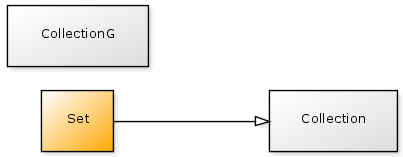

A Set is a non-ordered collection that contains distinct elements
(with regards to the G.equals(Object) operation)
@CompilerIgnore "true"
@ScalaCompilerName "k2.standard.Set"
| Method Summary | |
|---|---|
Void |
add()
|
OrderedSet[G] |
asOrderedSet()
|
Set[G] |
asSet()
|
Integer |
count()
|
Boolean |
equals(Object)
|
Set[Object] |
flatten()
|
Set[G] |
intersection(Collection)
|
Set[G] |
minus(Set)
|
Void |
remove()
|
OrderedSet[G] |
sortedBy()
|
Set[G] |
symmetricDifference(Set)
|
Set[G] |
union(Set)
|
Bag[G] |
unionWithBag(Bag)
|
Void add[()
Overrides Collection[G].add(G) Adds element to the Set if it is not already contained by the Set, does nothing otherwise
@traceability_text_reference "file:/mnt/extradisk/builds/workspace/org.kermeta.language.library_master/org/kermeta/language/org.kermeta.language.library.standard/src/main/kmt/kermeta/standard/collections.kmt;10504;10548"
OrderedSet[G] asOrderedSet[()
Overrides Collection[G].asOrderedSet() Returns a new OrderedSet that contains all elements of current Set More efficient version of OrderedSet[G].new.addAll(self)
@traceability_text_reference "file:/mnt/extradisk/builds/workspace/org.kermeta.language.library_master/org/kermeta/language/org.kermeta.language.library.standard/src/main/kmt/kermeta/standard/collections.kmt;12526;12577"
Set[G] asSet[()
Overrides Collection[G].asSet() Returns a new Set composed of all elements of current Set More efficient version of Set[G].new.addAll(self)
@traceability_text_reference "file:/mnt/extradisk/builds/workspace/org.kermeta.language.library_master/org/kermeta/language/org.kermeta.language.library.standard/src/main/kmt/kermeta/standard/collections.kmt;12299;12336"
Integer count[()
Overrides Collection[G].count(G) Returns the number of instances of element in the Set
@traceability_text_reference "file:/mnt/extradisk/builds/workspace/org.kermeta.language.library_master/org/kermeta/language/org.kermeta.language.library.standard/src/main/kmt/kermeta/standard/collections.kmt;11303;11352"
Boolean equals[(Object)
Overrides Object.equals(Object) Returns a Boolean stating whether the provided element is equal to the current Set The provided element is equal to the current Set if:
Set[Object] flatten[()
Returns a new Set which content includes all non-Collection elements of the current Set, and, for each Collection element of the current Set, as many elements as the Collection contains Duplicates are removed
@traceability_text_reference "file:/mnt/extradisk/builds/workspace/org.kermeta.language.library_master/org/kermeta/language/org.kermeta.language.library.standard/src/main/kmt/kermeta/standard/collections.kmt;13072;13116"
Set[G] intersection[(Collection)
Returns a new Set corresponding to the intersection of the Set elements with the current Set
@traceability_text_reference "file:/mnt/extradisk/builds/workspace/org.kermeta.language.library_master/org/kermeta/language/org.kermeta.language.library.standard/src/main/kmt/kermeta/standard/collections.kmt;11801;11869"
Set[G] minus[(Set)
Returns a new Set corresponding to the difference between the current Set and the Set elements, ie all elements contained by the current Set that do not appear in the elements Set
@traceability_text_reference "file:/mnt/extradisk/builds/workspace/org.kermeta.language.library_master/org/kermeta/language/org.kermeta.language.library.standard/src/main/kmt/kermeta/standard/collections.kmt;12078;12132"
Void remove[()
Overrides Collection[G].remove(G) Removes the element from the Set if it is contained by the Set
@traceability_text_reference "file:/mnt/extradisk/builds/workspace/org.kermeta.language.library_master/org/kermeta/language/org.kermeta.language.library.standard/src/main/kmt/kermeta/standard/collections.kmt;10667;10714"
OrderedSet[G] sortedBy[()
Returns an ordered set of the set elements sorted using the given comparator. The comparator must return an integer n such that
Set[G] symmetricDifference[(Set)
Returns a new Set which contents corresponds to the symmetric difference between current Set and Set s, ie all elements of each Set that do not appear in the other one
@traceability_text_reference "file:/mnt/extradisk/builds/workspace/org.kermeta.language.library_master/org/kermeta/language/org.kermeta.language.library.standard/src/main/kmt/kermeta/standard/collections.kmt;12771;12832"
Set[G] union[(Set)
Returns a new Set corresponding to the union of the Set elements with the current Set
@traceability_text_reference "file:/mnt/extradisk/builds/workspace/org.kermeta.language.library_master/org/kermeta/language/org.kermeta.language.library.standard/src/main/kmt/kermeta/standard/collections.kmt;11461;11515"
Bag[G] unionWithBag[(Bag)
Returns a new Bag corresponding to the union of the Bag elements with the current Set
@traceability_text_reference "file:/mnt/extradisk/builds/workspace/org.kermeta.language.library_master/org/kermeta/language/org.kermeta.language.library.standard/src/main/kmt/kermeta/standard/collections.kmt;11624;11685"